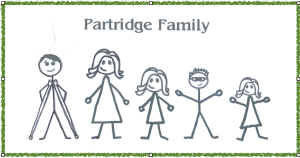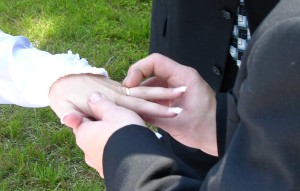 Becoming a disabled parent means that your disability becomes a family affair. It is not only you the disability affects – it impacts your spouse and children as well. In a sense your disability becomes your family’s disability.
Becoming a disabled parent means that your disability becomes a family affair. It is not only you the disability affects – it impacts your spouse and children as well. In a sense your disability becomes your family’s disability.
While discussing with my wife what I felt I have accomplished since being disabled, she said, “None of it had to do with your leg, it is who you are, and you would have done those things anyway”. Interesting, over the next few days while I pondered over thinking that maybe I haven’t really accomplished anything, I realized I had accomplished more than I thought. While we don’t want our disability to define us, in reality it does. It defines us because it is what we work around every day, it is why we have to make changes in how/what we do and for me why I require crutches. That doesn’t mean the disability has to become who we are. Maybe my accomplishment was in not letting my disability change the person I was. So yes, my leg defines me physically. Yet what it doesn’t define is who I am. I am not my disability. I am not the crutches. I am still the person I was before the disability. It doesn’t define who am because I don’t let it, but it certainly affects my life.
It wasn’t that I didn’t ever consider how my disability impacted my wife and kids. In fact, my family is the reason I didn’t throw in the towel, there’re the reason I remained as independent as I could, there’re the reason I force myself on to the crutches, and they are the reason I forced myself back into life. What I realized during that same conversation with my wife was that while I concentrated on pushing myself and not letting my disability stop me, I neglected the losses my wife endured. I thought that if I pushed myself physically, proved my complete independence, she would reap the rewards as well. What I was missing was how my disability had also changed my wife’s life. While I have been pushing myself physically to achieve great independence, I had not considered my wife’s losses and how my disability affected her emotionally. The way I need to handle my physical losses is inflicting me with more physical pain and causing me to not be emotionally there for her. My need to constantly be pushing myself physically in the end is causing me greater physical pain and my wife greater emotional pain.
The Challenge Disability Puts on a Marriage!
When learning to live with disability you need to learn what you can do for yourself, your spouse/partner also needs to learn what you can do for yourself, and you both need to learn what you can do for each other. The disability creates a learning curve in the partnership. Household duties might have to be redistributed and how you care for and support each other might have to change. Disability doesn’t excuse either partner from doing what is reasonably expected of them though – it is still a partnership and both members still need to do their part to make it work. That’s the challenge! It is so important to communicate and brainstorm ways you can support and help your partner despite your disability. It still isn’t all about you! So maybe I need to “check my ego at the door”. Maybe I can do more for my wife by accepting that there are things I can no longer do. This won’t be easy for me as it goes against my nature. But is there a happy medium? Can I prioritize my physical activity and have less pain so I can be more emotionally available for my wife?
Ways your disability affects your spouse/partner.
Emotionally– While we are dealing with pain, surgeries, loss and emotional trauma, our spouses are also overcome with their emotions of loss and sadness. They are often suppressing their emotions to protect us. Our spouse/partner now feels like they need to be the emotionally strong one in the marriage.
Physically– There is often a reversal in household chores. While you are coming to terms with what you can no longer do, your spouse/partner is coming to terms with not only doing, but learning many household jobs they never did. The once equally-shared responsibilities become lopsided.
Change in family activities– How the family spends quality time together changes. Not only does your disability affect your activities, it affects your spouse’s/partner’s activities as well. They now always have to consider your needs and whether you can join in the activity. If they continue activities you are no longer able to do they wind up feeling guilty. Many of the things my wife and I did together are lost, not only for me but for my wife as well.
Mental Stress– Constant worrying about you. Tormented by seeing you in pain. Feeling guilt about the pain you’re in. Feeling like they are not doing enough to help you. Unsure what they can reasonably ask you to do for them. Feeling guilty about asking you to do something that needs to get done. Feeling angry when seeing you do something you want done that they never would have asked you to do. My constant preoccupation is my pain, while my wife’s is feeling like she needs to be looking out for me.
Caretaker– Their role shifts from being a partner to a caretaker. No matter how independent I am, there will always be some very basic needs I have that someone without a disability doesn’t have. An example is feeling the need to be a caretaker: A family friend suffers from a chronic illness that requires him to maintain a strict eating schedule. His wife made a point to ask us the details of our daughter’s Bat Mitzvah. Her inquiry was due to his strict daily meal requirements and she needed to make sure she wouldn’t need to bring along a snack for him. She said “he would never ask” (ego in action).
.
Dealing with our egos– Our spouses/partners are constantly battling our egos. We don’t accept help graciously, we don’t ask for help, we refuse help we could use and sometimes our frustrations cause us to just be a big pain in the butt.
Life change– Just as disability changes our lives forever, it changes your spouse’s/partner’s life forever. The very same day that I knew my life would be forever changed, was the very same date that my wife said changed her life. For me I knew I would never physically be the same, while she took on the role of being the emotionally stable one in the marriage.
 Marriage is a partnership. It takes a lot of work to follow the “to have and behold from this day on, for better or for worse, for richer, for poorer, in sickness and in health, to love and to cherish; until death do us part.” Add in a disability and every aspect of the marriage may be impacted. It takes a special person to stick around. It is a fact that a large percentage of marriages end after a spouse becomes chronically ill or disabled. In my desperate plight to prove my physical abilities and independence, I neglected to see or understand how this was affecting my wife. I thought she would be happiest if I picked up where I left off before the disability and just did everything. All I was accomplishing was releasing my frustrations and anger in her presence. What I need to do is allow her to do more to help me physically, and I need to help her heal emotionally. She no longer needs to carry the emotional burden of the family alone. I believe that in reality we need to understand that our disability does impact our family and with that understanding we then need to reexamine how the partnership works.
Marriage is a partnership. It takes a lot of work to follow the “to have and behold from this day on, for better or for worse, for richer, for poorer, in sickness and in health, to love and to cherish; until death do us part.” Add in a disability and every aspect of the marriage may be impacted. It takes a special person to stick around. It is a fact that a large percentage of marriages end after a spouse becomes chronically ill or disabled. In my desperate plight to prove my physical abilities and independence, I neglected to see or understand how this was affecting my wife. I thought she would be happiest if I picked up where I left off before the disability and just did everything. All I was accomplishing was releasing my frustrations and anger in her presence. What I need to do is allow her to do more to help me physically, and I need to help her heal emotionally. She no longer needs to carry the emotional burden of the family alone. I believe that in reality we need to understand that our disability does impact our family and with that understanding we then need to reexamine how the partnership works.
Thank you for reading! Subscribe to never miss a post or come back in two weeks when it is time to discuss Therapeutic Amputation.



